 By Bob Difley
By Bob Difley
Though we dealt with water in last week’s post we did not answer the question of what to do with waste water from the sinks and shower (the somewhat yucky part) or with black water from the toilet (the really yucky part). So bear up and let’s face it now.
The main difference between boondocking and hookups regarding waste tanks is the length of time the yucky stuff stays in the tanks. Hookups, very short. Boondocking, long.
That means that when boondocking you should:
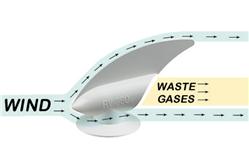 Monitor the levels of each tank.
Monitor the levels of each tank.- Have an idea of the tank levels just to affirm that your gauges are correct.
- Determine how fast your tanks are filling and how much time you have left before you need to dump.
- Install a venturi-type roof vent (photo) to your black water tank to extract odors. No chemicals needed.
- Move to a dump station before your gray tank bubbles up into your shower.
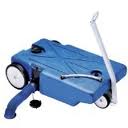 Use conservation habits to empty as little into your holding tanks as possible.
Use conservation habits to empty as little into your holding tanks as possible.- Dump your tanks into a portable holding tank (sometimes called a Blue Boy – see photo) and transport it to a dump station rather than moving your whole rig. If you are in a no-hook-up campground with a dump station, you can tow the Blue Boy for short distances. The difficulty is loading a full tank into the bed of your pick-up or the trunk of your dingy.
The other trick for extending your boondocking days between runs to the dump station requires new ways to deal with water usage. The black water tank will not likely be the limiting factor to your boondocking days since the gray tank fills faster. Other than the amount of water you use to flush the toilet (be conservative) the emphasis should be put on the gray tank. Using the tips in last week’s post on conserving the use of water will naturally also put less into your gray tank.
Some other ways to reduce the flow into you gray tank include:
- Wipe all food off dishes and pans before washing so food does not get into your wash water.
- Wash dishes in plastic dishpan and when finished dump on a thirsty plant.
- Rinse dishes collecting water also in a plastic tub and also pour on a tree or plant.
- Save water in a bucket or tub when running shower to warm it up and use to flush toilet.
- Fill a Sun Shower from a stream or lake and use for outside showers.
- Never leave a faucet running into a sink and then into the drain to the tank. Always collect running water and use for other things, like for brushing teeth, cooking spaghetti, making coffee, drinking, etc.
You may wonder about the ethical or legal consequences of pouring your used gray water out on the ground or on a bush. This is always a subject of debate among boondockers and does not have simple black and white answers. After contacting the Arizona office of the BLM on this question, I received the following reply:
. . . if the gray water creates a hazard or a nuisance a Law Enforcement Officer can cite (or in extreme circumstances arrest) an individual. This would go beyond simple gray water dumping, and the citation would likely be for some other offense related to degradation of resources or public health and safety issues. Law Enforcement Officers in the field have discretion in applying the laws and regulations . . .
You can read a more complete discussion of gray water dumping in my previous blog. Bottom line–discretion and common sense. And don’t just dump a full tank out on the ground, as if that had to be said.
Check out my website for more RVing tips and destinations.
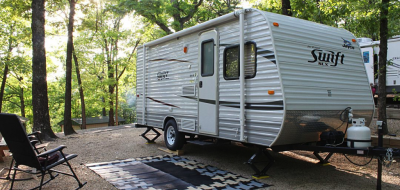

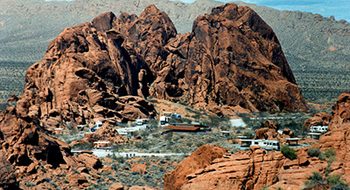
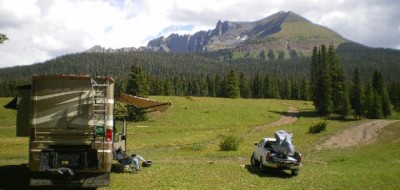
Pat
Bob, once again, these have been great posts! Thanks for sharing your experience and wisdom!
One thought that crossed my mind, and that is some of your suggestions (other than ones obviously related to an RV) work at home as well, such as conserving water.
Mike Whitmore
I am curious. Why is it OK to pour a plastic dishpan of water on a thirsty bush but a bad nasty to drain the gray water tank. It seems to me that these the same water? I did that for years tent camping!
Dave Planitzer
Not related to water but power and I have not seen it mentioned before.
Most RVs have radios with a clock and light. These draw power from the battery(s). Add an external switch to the power line feeding the radio to conserve battery.
When you want the radio turn the switch on. Most of us have portable clocks so time is always available.
Bob Difley
Dave says, “Most RVs have radios with a clock and light. These draw power from the battery(s). Add an external switch to the power line feeding the radio to conserve battery.”
An excellent idea. All RVs have hidden (phantom) drains, like the radio light and clock. It would be wise to identify all phantom drains and put a switch on them, especially when long term boondocking.
Jim G
Chuck; Did I ever have you for an English teacher?
Bob Difley
catchesthewind mentions using disposable plastic. Check out this website http://www.branchhome.com/index.php?main_page=product_info&cPath=36&products_id=181&zenid=jmm6hctb9itc5hb3o7ed93kit0
where you can buy sugar cane based tableware that is disposable, recyclable, biodegradable, and compostable.
Chuck
The mind spells and the fingers mis-spell! Moare is more…
The eyes see what the mind ignores…
Chuck
The concept of premade meals sounds good. But! What if you spend months boondocking? We don’t have enough room in our rig for that many premade meals. Many of the suggestions for conserving resources while boondocking are good for short term. Long term is another story which Bob has covered in many of his previous blogs. Look them up or get one of his good books for moare info.
gerald strickland
We have dumped our “clean” gray water from washing and rinsing dishes on bushes/trees and taken outdoor showers for years but we are very careful to stay well away from creeks/rivers. We have returned to some of those campsites many times over the years and have never seen any indications of damage to plants.
Jim G
After witnessing my wife prepare evening meals and taking note of the amount of water used to prepare, rinse, etc. not to mention the time spent in preparation and dealing with the gray water issues the suggestion to prepare meals in advance makes perfect sense. Now I have to convince my wife, which will probably be the most difficult challenge. Oops, I hear her coming, time to post and close the web page.
Drew
I have not read the previous blog but you can always use a Flush King or some other type of device hooked to your dump outlet that allows the gray tank to fill the black.
catchesthewind
For tableware use disposable plastic.
Use plastic baggies for pre-measured meals. ie scrambled eggs. cook in microwave. For evening meals precook at home and place in freezer. U get the drift.